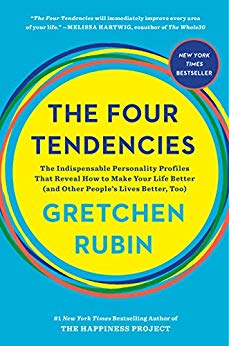

This article is an excerpt from the Shortform summary of "The Four Tendencies" by Gretchen Rubin. Shortform has the world's best summaries of books you should be reading.
Like this article? Sign up for a free trial here .
What are the four tendencies from Gretchen Ruben’s book? What are the personality traits, strengths, and weaknesses associated with each tendency?
The four tendencies are the Upholder, Obliger, Questioner, and Rebel. Knowing what type of tendency you are can help you find a better job fit, discover your strengths, and understand those around you better.
Here is an overview of each of the four tendencies.
About the Four Tendencies
People are certainly more complex than just how they respond to expectations, and Rubin’s four tendencies (Upholder, Obliger, Questioner, and Rebel) only cover the scope of how you respond to expectations.
Your tendency can’t be changed: it’s a part of your nature. All the tendencies have strengths and weaknesses, and no one tendency seems to be more successful or happier than the others. The happiest, most successful people are the ones who can learn to work with their tendency instead of against it. Any tendency can thrive in any career, given that they adapt the role to meet their strengths and weaknesses.
In this 1-page summary, we’ll cover the four tendencies at a high level, discussing each one’s strengths and weaknesses and how to interact with them. The full summary has far more detail on each tendency, tips on how to do better as your tendency, and strategies to interact with the tendency in different scenarios (your romantic partner, your children, your colleagues at work).
Upholders
Upholders readily respond to both external and internal expectations. They think expectations, in general, are important, and enjoy fulfilling both their own and others’. They appreciate balance between doing what other people expect of them and doing what they expect of themselves—in the age of self-care, they’ve figured out how to take care of themselves without losing their productivity.
For example, if an upholder’s their boss asks them to stay late to finish a project and they know it’s important, they’ll stay (fulfilling external expectations); but if they happen to have an event they signed up for months ago and are excited about, they’ll most likely go to the lecture (fulfilling internal expectations), and work on the project later.
Strengths of Upholders
Upholders like schedules and routines, form habits easily, and don’t make feel pressured or trapped by expectations—Upholders feel free, creative, and productive when they have expectations placed on them. If there’s an expectation, they’ll fulfill it; if expectations conflict with one another, Upholders will figure out what expectation is most important to them, and prioritize that one first (they’d probably still try to fulfill the other expectation, if possible).
Upholders are good self-preservationists, for the most part. They take care of themselves and have good habits. Being able to fulfill their internal expectations on their own means they often lead satisfying lives, finding ways to be productive in their work and careers without sacrificing their personal values or getting burnt out from doing too many things for other people and not enough for themselves.
Weaknesses of Upholders
Upholders sometimes follow the rules even when it’s better not to. Rubin (an Upholder herself) recounts waiting at a boat taxi stand that was clearly non-functioning when a taxi stand a few yards up the river was active, all because someone told her that’s the taxi stand she should wait for. In a related weakness, Upholders generally have good habits, but can rigidly keep the habit far after it’s necessary or good for them.
Upholders also aren’t very adaptable or flexible in their schedules and routines. Because they have no difficulty meeting expectations, when other people do have difficulty, Upholders can be disdainful, impatient, or rude.
Dealing with Upholders
At work, upholders make great colleagues and bosses because they believe expectations are important. However, occasionally an Upholder might need help prioritizing tasks and making priorities clear—since all expectations are important to them, they might not get to the right things first.
Upholders also occasionally need help not meeting expectations, when a different balance of expectations would make them happier. When arguing with them, play to their values: acknowledge the rules or expectations they’re responding to, and make another priority more important than following that rule or meeting that expectation.
Questioners
Questioners readily respond to internal expectations, but not external expectations. They’re committed to logic, information, and efficiency, and refuse arbitrary, inefficient, or illogical expectations. The Questioner responds best to her own internal expectations because she’s already thought through these expectations and made sure they’re justified, achievable, and logical.
External expectations need to be justified—once they are, the Questioner will view them as internal expectations and will have little trouble fulfilling them. For example, a Questioner might get a text from her husband asking her to pick up lunch meat on her way home. If that’s all the text says, the Questioner might not do it: her husband can pick up lunch meat if he really wants it, they have plenty of other food in the house. But if the husband texts that they need lunch meat because their daughter has two field trips that week and needs bagged lunches, the Questioner will do it: now it makes sense and has justification.
Strengths of Questioners
Once Questioners agree with the reasoning behind something, they’re self-directed and don’t need supervision. They meet justified expectations as easily as Upholders meet any expectations.
Questioners make great employees and partners because they want to improve any process they’re involved in to make it the most efficient and logical, and they do thorough and exhaustive research to make the best decisions possible. Questioners want to live in a world where everything makes sense and is as efficient as possible—they question endlessly in pursuit of that world.
Weaknesses of Questioners
However, their refusal to meet expectations without reason can sometimes lead to trouble, particularly in school. Others often find their questions tiring and obstructive, and feel like they raise needless questions and refuse to respect authority.
And, because of their relentless research and desire to make the best decision, Questioners can also sometimes fall into analysis-paralysis, where they become incapable of making a decision based on how much research they’ve done.
- Questioners and people around them can help them avoid analysis-paralysis by setting limits on research, giving deadlines, and finding people or sources they admire enough to follow their lead.
Dealing with Questioners
If you get annoyed by hearing too many questions from Questioners, help restrict their questioning by setting limits, guidelines, and deadlines for decisions. Remind yourself that their questions aren’t confrontational—Questioners need the answers they seek to do the work you want them to do.
Make sure to justify your own questions to Questioners, which will help them understand why you’re asking.
Questioner spouses have some difficulty in relationships. If your spouse is a Questioner, remember that the more justifications you give them, the more likely they’ll be to do what you need them to do—asking them to do something is rarely enough to get them to do it.
Obligers
Obligers readily respond to external expectations, but not internal expectations. They meet deadlines and follow through for bosses, colleagues, spouses, and so on—but if there are no external expectations, Obligers almost always fail to complete the task, no matter how important it is to them. Picture a high school track star who thrived when her team depended on her, but now finds it hard to run for her own sake, no matter how much she wants to.
Obligers are most likely to wish they were another tendency: since they are capable of meeting other people’s expectations without problem, they view their inability to meet internal expectations as laziness or self-sacrifice, and they often can’t figure out why they can’t meet internal expectations.
Strengths of Obligers
Obligers are the “rock of the world”—everyone can depend on them. They’re most likely to contribute to home and work, and get along well with other tendencies. They keep the people around them very happy, for the most part.
Weaknesses of Obligers
Obligers simply cannot meet internal expectations unless they figure out sources of external accountability. If they don’t have any external accountability, they need to organize it for themselves.
- They can try various forms of accountability to find out what works for them, such as automated email reminders, to-do lists, or accountability partners or groups.
Because Obligers expend so much energy fulfilling others’ expectations, they get easily burnt out. If they get too burnt out or the expectations are so high they can’t meet them, Obligers can go into Obliger-Rebellion mode, where they suddenly, without warning, refuse to meet any expectations: everything’s fine until it absolutely isn’t.
- People around Obligers can help them avoid Obliger-Rebellion by setting up systems that encourage them to say no more often, helping them delegate tasks, pushing them to make time for themselves, and encouraging them to take breaks.
Dealing with Obligers
We know Obligers struggle with internal expectations, so if they request accountability, find a way to give it to them, because they need it.
Be wary of setting expectations for Obligers that are too high, or of accidentally setting expectations with offhand comments. They’ll strive to follow the expectation, when it may not be all that important.
Rebels
Rebels resist all expectations, internal and external—they do what they want to do. They value choice, freedom, and self-expression or identity, and enjoy bucking convention and expectation.
Picture a Rebel who wants to write of her own spontaneous desire. She can do it without a problem. But then her friends say they love her work and suggest she get an agent and publish. Suddenly there are expectations – people expect her to do certain things. The Rebel’s internal conflict with expectations can cause her to purposely act counter to advice she receives, or to stop writing at all.
Strengths of Rebels
Rebels teach everyone else that we’re “freer than we think”: we can do what we want to, and the world will still turn. And Rebels with a cause can be incredibly useful—they serve as the voice of dissent and an alternative to the status quo. (Shortform example: Most revolutionary leaders are probably Rebels: they take issue with the expectations of a particular power, and the more they’re told they’ll fail or that they shouldn’t fight, the harder they pursue their goal.)
Weaknesses of Rebels
But that characteristic can backfire, too: the harder you push a Rebel to do something, the harder they resist.
Because of this, Rebels are the most frustrating group to other people. They expect Rebels to “grow out of it,” “grow up,” or mature beyond their Rebel nature. But that’s just what it is—their nature—and it isn’t a phase they’ll grow out of, it’s the tendency they’ll have to learn to live with (and so will everyone else).
Dealing with Rebels
A good rule of thumb for dealing with Rebels is to present them with information, consequences, and choice, then step back. Give them the information they need to make an informed decision, the consequences they’ll suffer depending on what actions they take, and then the freedom to choose for themselves. They’ll feel better making their own decision, and it may be in the direction you would have suggested yourself.
———End of Preview———

Like what you just read? Read the rest of the world's best summary of Gretchen Rubin's "The Four Tendencies" at Shortform . Learn the book's critical concepts in 20 minutes or less .
Here's what you'll find in our full Four Tendencies summary :
- What the Four Tendencies are, in complete detail
- How to compensate for your tendency's weakness
- Which tendency you pair best with romantically
- How to deal with other people's tendencies






